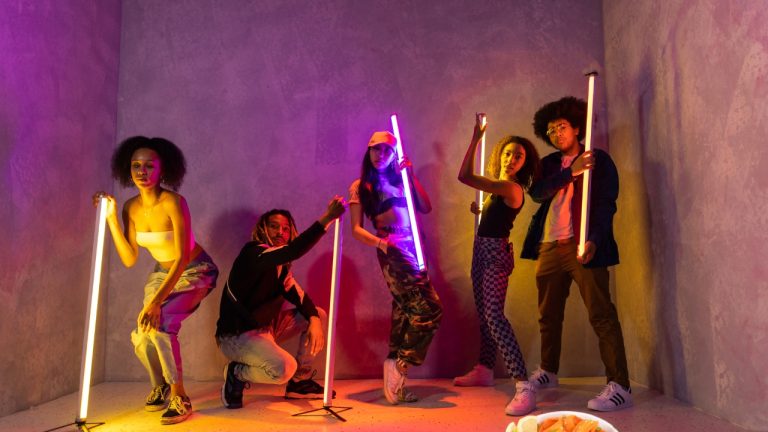It usually starts with a text.
Someone younger says something like, “That outfit is lowkey fire, but the vibe? Mid.”
And you freeze. Not because you’re offended. Because you’re doing mental gymnastics trying to figure out if “mid” is good or bad. (Spoiler: it’s bad.)
That tiny pause right there that hesitation before replying is how you know you’re aging on the internet.
The Generational Language Divide Is Real
Language has always been the quickest way to expose how old you are without saying your age. The slang you use, or fail to use, gives you away faster than your Spotify Wrapped.
If you grew up saying “cool beans” or “legit,” congratulations, you’re probably fluent in Millennial Standard English.
If “rizz,” “no cap,” or “it’s giving” roll off your tongue naturally, you might just have Gen Z citizenship.
But here’s the twist: half of Gen Z can’t even keep up with themselves. Words mutate faster than filters on Snapchat. What was “slay” last year might be “cringe” today, and tomorrow it could be “ironically slay.” Language isn’t just communication anymore; it’s a form of cultural survival.
Why Gen Z Treats Words Like Apps
Think about it. Every generation before used slang as rebellion boomers had “groovy,” Gen X had “rad,” millennials had “lit.” But Gen Z doesn’t just rebel. They remix.
They treat language like an open-source project, constantly updating it, deleting features, rebranding meaning, and throwing in emojis as punctuation. “Sus” evolved from video game shorthand to moral judgment. “Bet” stopped being a wager and became a form of agreement. “Dead” no longer means death, it’s laughter so strong it’s fatal.
They communicate through layers of irony, speed, and shared context. To outsiders, it’s gibberish. To insiders, it’s intimacy.
Funny how that happens.
Could You Actually Pass the Quiz?
Alright, let’s play pretend. You’ve been dropped into a group chat full of 19-year-olds. You’re armed with your phone, your dignity, and a deep desire not to be “that millennial.” Can you survive? Let’s see.
- Someone says “It’s the main character.”
You think: compliment or insult?
It’s a compliment they mean your energy could carry a movie. - They call their friend “delulu.”
You laugh, thinking it’s a typo for “delusional.”
It is. But also, it’s affection. Being “delulu” means believing in your unrealistic romantic storyline and owning it. - You text “LOL” and get left on read.
That’s because “LOL” now sounds passive-aggressive. Gen Z laughs with skull emojis 💀 or “I’m cryinggg.” - They say “no cap.”
Translation: “no lie.” You can thank TikTok for that one. - Someone says “that’s so mid.”
Not the compliment you hoped for. It means “average.” Brutally average.
If you scored 4 out of 5, congratulations. You’re still holding on. Anything less, and you might want to audit a Gen Z language course or just scroll TikTok for an hour. It’s basically Duolingo for vibes.
The Psychology Behind Slang Obsession
Slang isn’t random. It’s identity work in real time.
Gen Z came of age in chaos algorithms shifting, pandemics isolating, politics polarising. When everything feels uncertain, inventing words becomes a form of control. You rename your world so it feels like yours.
That’s why “it’s giving” caught on so hard. It’s flexible, emotional, and communal. Saying “it’s giving broken energy” or “it’s giving goddess-core” doesn’t just describe something it declares how you feel about it. Every slang word becomes a little protest against boring language.
And millennials? They used to do the same thing. Just on a slower internet. Remember when “YOLO” was everywhere? Or when “adulting” was a revelation? Same impulse, different speed. Gen Z just learned to refresh faster.
The Hidden Rules Nobody Explains
Here’s the part that trips everyone up. Gen Z slang isn’t only about meaning. It’s about tone.
Say “slay” too earnestly, and you sound like you’re trying. Say “period” at the wrong moment, and it’s awkward silence. The secret is detachment. They speak like everything’s a meme, even when it’s not. Irony is their shield.
They don’t just talk, they quote formats. A simple “help” or “be so for real” can carry a universe of humour because it references a thousand viral contexts. That’s why explaining a joke kills it. It wasn’t meant to be decoded. It was meant to be felt.
When Millennials Try Too Hard
You can always tell when someone learned slang from a brand. The sentences sound… forced. Like they Googled “how do kids talk in 2025” and stitched phrases together. “Fam, this burger is bussin fr fr.” No. Stop. Nobody’s saying that sincerely anymore.
Millennials fall into this trap a lot. We (yes, we) discovered irony late. Our humor was self-deprecation; theirs is absurdism. When we say, “I’m such a mess,” they say, “girl help.” It’s the same emotion, but compressed for digital speed.
Trying too hard is the only unforgivable sin. Authenticity is currency now even if it’s chaotic. Especially if it’s chaotic.
Why You’ll Never Fully Keep Up (and That’s Okay)
Here’s the truth nobody admits: language belongs to whoever needs it most. And right now, Gen Z needs it to make sense of a world that doesn’t. That’s why it keeps mutating. Why it’s never still.
You can study slang like a linguist, but the moment you master it, they’ve already moved on. It’s not about words, it’s about belonging. About feeling seen by the people who speak the same weird digital dialect.
So instead of memorising vocabulary, maybe the better test is empathy. Do you understand why they talk that way? The irony, the exaggeration, the mashup of sincerity and sarcasm it’s all emotional shorthand. They’re just finding ways to stay human in an online noise storm.
So, What’s Your Score?
If you laughed, cringed, or recognised yourself in any of this, you already passed.
Because the real quiz isn’t about knowing every term. It’s about noticing how language mirrors the times, the chaos, the humour, the exhaustion.
You can tell a lot about a generation by its inside jokes. Gen Z’s jokes are faster, sharper, more fluid but deep down, it’s the same instinct that’s always been there: trying to make sense of growing up in real time.
So next time someone says “it’s giving millennial energy,” don’t panic. Smile. They’re teasing, not judging. Probably.
And who knows maybe next year, “millennial” will be cool again. (Unlikely, but we can dream.)
If this made you pause or smile, explore more playful, thought-provoking quizzes on Trendy Quiz because self-discovery should always feel fun.




